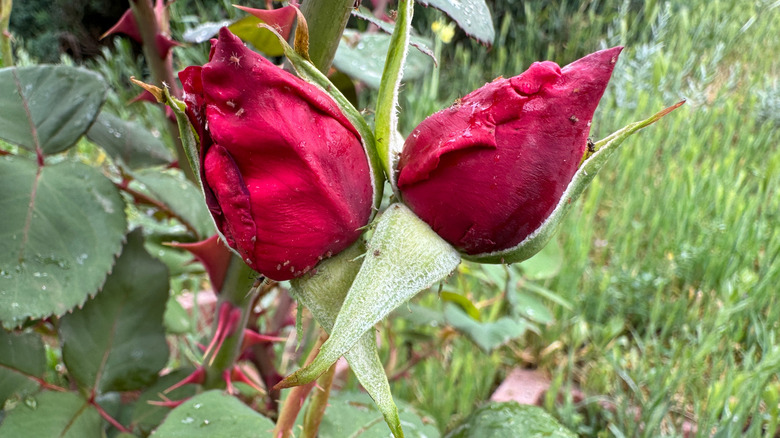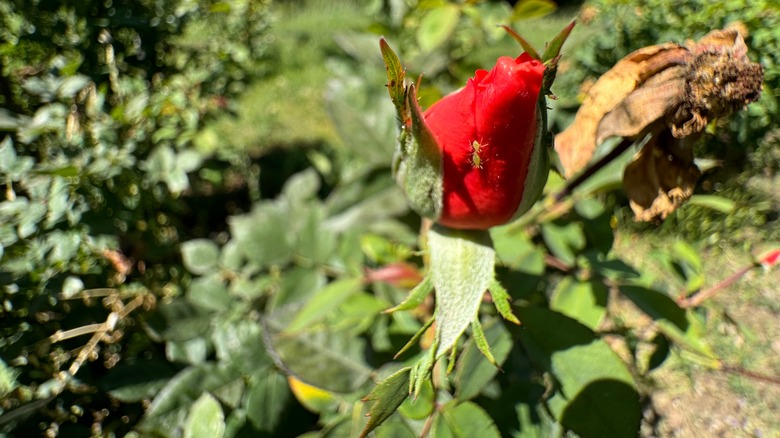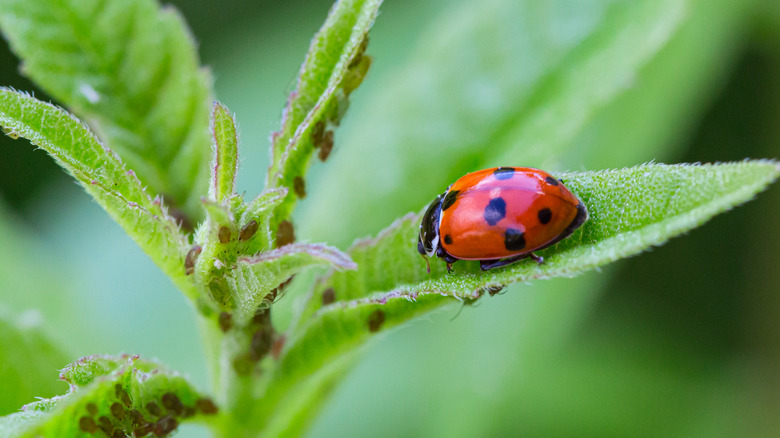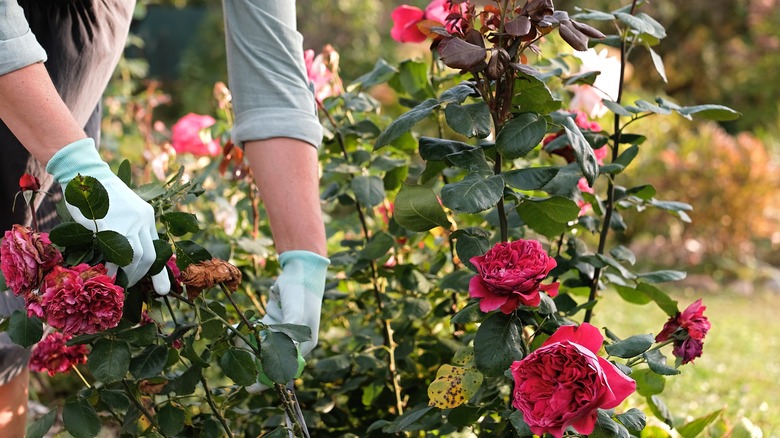At War With Aphids? Don't Be Surprised If Your Flower Garden Suffers
If you have a garden, you have aphids. These tiny critters have a reputation for decimating plants, and many gardeners are quick to grab the spray bottle as soon as they spot any. After all, if you don't get rid of aphids quickly, they'll destroy your garden, right? Well, while I used to believe aphids were the enemy, I now leave the little sap-suckers alone. And, you know what? I'm fine. My roses are fine. Everyone's fine.
When I moved into my first home and finally had a garden of my own, everything I learned from my grandmother and other gardening family members told me to banish the aphids. But I'm currently in the process of replacing my traditional suburban lawn with a more diverse, mostly native ecosystem. And, unfortunately, a key part of any healthy ecosystem is bugs — aphids included. So, when the tiny pests swarmed my brand new David Austin bare root roses last spring, I just left them alone.
Soon enough, my garden was buzzing with aphid predators and my roses bloomed without skipping a beat. As much as watching aphids feast on your flowers can make you anxious, the reality is that the stress their eating habits cause pales in comparison to the stress plants experience in a sterile garden devoid of pollinators and predators. So, if you want your flower garden to thrive in the long run, put down the spray bottle and just leave those aphids alone.
Aphids are rarely the death sentence gardeners think they are
Aphids have been feeding on plants since before humans began gardening. So, how did plants survive aphid attacks before we came into the picture? For one, these pests aren't all that destructive most of the time. While an especially heavy infestation can harm a plant, almost always, aphids are nothing to worry about. If an infestation starts to become more than the plant can handle, many have developed their own defense mechanisms to keep the pests from doing serious damage.
Some plants emit smells that repel aphids. Others grow thorns or aphid-proof barriers. My favorite defense mechanism is a set of signals known as herbivore-induced plant volatiles (HIPVs) that some plants, roses included, send out. These are essentially signature blends of odors that plants emit to tell other parts of the plant and nearby beneficial predators about the attack. The same HIPVs can be used to warn nearby plants of the threat so that they can ready their own defenses before the aphids reach them.
By leaving the aphids, I was effectively letting my rose bushes call the aphid-eating predators they needed and warn other plants in my garden about the pests. If I had sprayed the aphids every time they repopulated, I would have interrupted this signaling process. And I would have interrupted it for no reason, as roses, like other plants, can generally tolerate an aphid infestation without issue.
Aphids are good for your garden in the long run
Letting plants tolerate aphid infestations also encourages those plants to attract good insects into your yard, so leaving aphids alone is actually better for your flowers than spraying them. Admittedly, the delay between the first aphid sighting and the first predator sighting can be an anxious time. Every single bud was smothered in the pests. But, a few weeks later, I noticed a parasitoid wasp buzzing around a rose bush.
Over the next few weeks, I saw ladybugs, spiders, and other predators hanging out around my garden beds. While there were still some aphids, my roses weren't smothered in them anymore. The buds that the aphids fed on bloomed just fine and the bushes continued to put out new blooms all summer long.
Plenty of insects and spiders like to feast on aphids. Many of those predators also happily eat mites, slugs, and other common garden pests. They even serve as pollinators as they supplement their bug diet with nectar and pollen. These predatory insects are, themselves, preyed upon by other insects as well as bluebirds, sparrows, and summer tanagers. I've spotted most of those birds in my own yard. By resisting the urge to intervene, you can attract a variety of beneficial insects and birds that will keep each other in balance while allowing the plants in your garden to flourish.
If aphids are causing visible damage, your plants were probably already stressed
I've said that plants generally aren't seriously harmed by aphid feeding. But I'm sure there are a few gardeners reading this who've witnessed a plant get overwhelmed by aphids and die. While it's easy to blame the aphids, other factors were likely at play, too. Some common culprits are over-fertilization or plant stress.
Over-fertilizing plants is a common mistake gardeners make when dealing with aphids. An over-fertilized plant will put out tons of new growth quickly, making it a magnet for aphids who love tender new shoots. At the other end of the spectrum are stressed plants. Whether it's lack of water and light or a fungal disease, a stressed plant has a harder time defending itself against aphids than a healthy one. Identifying the underlying issue that made your plant more vulnerable can do more to help it thrive than spraying off the pests.
In gardens where pesticides are routinely used, the underlying issue may be the simple fact that beneficial insect populations have been decimated. Aphids produce multiple generations in a single season and repopulate very quickly, while many predators are slower to repopulate. So, the pests you're fighting with pesticides rebound quickly while the predators that were helping keep them under control take longer to recover. Still, ditching the pesticides now and leaving the aphids alone will be better for your garden in the long run. It just might take a few seasons to see your patience pay off.



